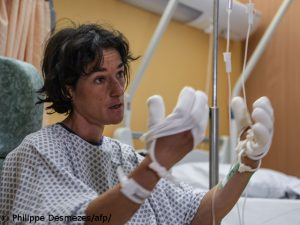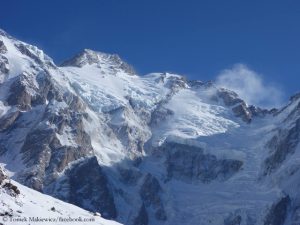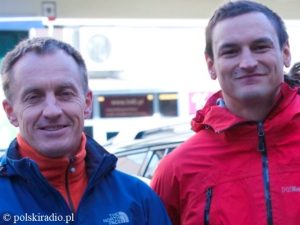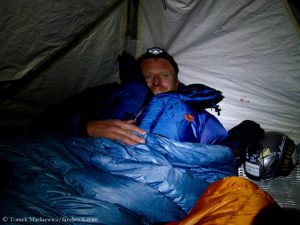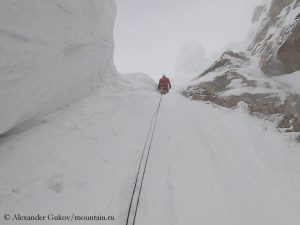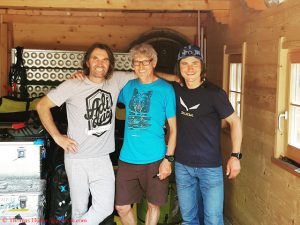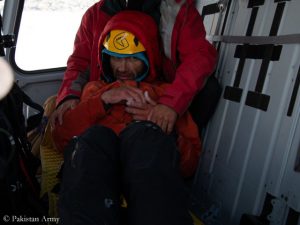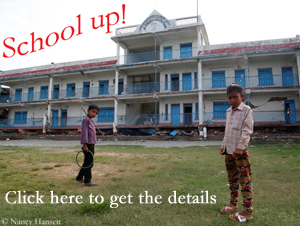Nanga Parbat: Triumph and tragedy
The ridge is narrow at the highest mountains in the world, between luck and danger, between life and death. On Thursday of last week, Elisabeth Revol and Tomek Mackiewicz reached the 8,125-meter-high summit of Nanga Parbat. Elisabeth was the first woman to succeed a winter ascent of this eight-thousander, Tomek the first Pole to set foot on the highest point of Nanga Parbat in the cold season. In the seventh attempt Mackiewicz had finally fulfilled his big dream. For Revol, it was the third attempt, all together with Tomek. The two climbers did not have time to enjoy the second winter ascent of Nanga Parbat on the summit. They were late, it was already 6 pm local time and dark. That was still the smaller problem. “Tomek told me ‘I can’t see anything any more’,” Elisabeth reports from a French hospital, where her severe frostbite on her hands and feet is being treated. “He hadn’t used a mask because it was a bit hazy during the day and by nightfall he had ophthalmia (an inflammation of the eye). We hardly had a second at the top. We had to rush to get down.”
Tomek’s condition deteriorated rapidly
Revol descended ahead, Mackiewicz followed clinging to her shoulder. Tomek’s condition deteriorated rapidly. The 43-year-old suffered from breathing trouble and frostbite. He was no longer able to reach their last high camp. Therefore, the two climbers ran for shelter in a crevasse at about 7,200 meters. At sunrise, “blood was streaming“ from Tomek’s mouth – a sign of an acute life-threatening high altitude edema. Elisabeth made several emergency calls, and some came through.
“They told me,‘If you go down to 6,000 metres, we can pick you up, and we can get Tomek at 7,200 meter’,” says Revol. “It wasn’t a decision I made, it was imposed on me.” To Mackiewicz, she remembers simply saying: “Listen, the helicopter will arrive late afternoon. I must go down, they’ll come to get you.”
Hallucinations with consequences
However, bad weather delayed the rescue operation. Elisabeth had to spend also the next night in a crevasse, at 6800 meters. She was so exhausted that she hallucinated: She was convinced someone would bring her hot tea if she gave a shoe in return. For five hours, she spent in her icy refuge without a shoe and suffered heavy frostbite. When Revol heard a helicopter, but found that it could not land because of the strong wind, she decided to continue descending – with wet gloves and frostbite on her feet. She did not know then that Denis Urubko and Adam Bielecki were climbing up towards her, reports the 37-year-old. At about 3 am in the morning she reached a camp on the Kinshofer route. “And then I saw two headlamps arriving. So I started to yell. And I said to myself,‘OK it’s going to be ok,“ recalls Elisabeth. “It was incredibly emotional.“
Decision about life and death
That applied also for the two rescuers. “It was a miracle,“ says Denis Urubko in an interview with desnivel.com. First, they got Revol in a tent and cared for her, then they rested until dawn from their exhausting speed climb. According to Denis, the rescue team was faced with a dilemma: “At that moment, we had to make a decision: either help Elisabeth to survive – or climb on, with very little hope of finding Tomek.“ After they had been informed by Revol about Tomek’s condition, and in addition, even worse weather was expected for the upcoming day, the rescuers decided with heavy heart not to continue the ascent and focus instead on the rescue of the Frenchwoman. They escorted Revol further down. At 4,800 meters, a helicopter landed and finally brought Elisabeth to safety. The search for Tomek was declared over because the rescue team saw no chance to find the 43-year-old Pole alive. She wants to “recover as soon as possible“ and then visit Tomek’s children, says Elisabeth. Mackiewicz leaves behind his wife and three children. For Tomek’s family, a fundraising was launched.
Given their all
For sure, a discussion will start now. Questions will be asked, like these: Should have Elisabeth and Tomek given up the summit and turn back earlier? Could the rescue operation have begun earlier? Would not a chance have existed to rescue Mackiewicz alive? Many who have never been on a high mountain will speak up now and do the moralizer. I think this should be answered: Elisabeth Revol and Tomek Mackiewicz have made their decisions self-responsible and only called for help when it became clear that they could not save themselves by their own efforts. In a short time and very unbureaucratically, a rescue operation was organized. The Pakistani helicopter pilots and the four climbers of the Polish K2 winter expedition, who were flown to the Nanga Parbat, risked a lot and gave their all to save Revol and Mackiewicz. All persons involved in the action are to be given thanks. That in the end only the Frenchwoman survived, but Tomek stayed forever on the mountain of his fulfilled dream is tragic, but was under the circumstances probably impossible to prevent. The ridge is narrow at the highest mountains in the world.



